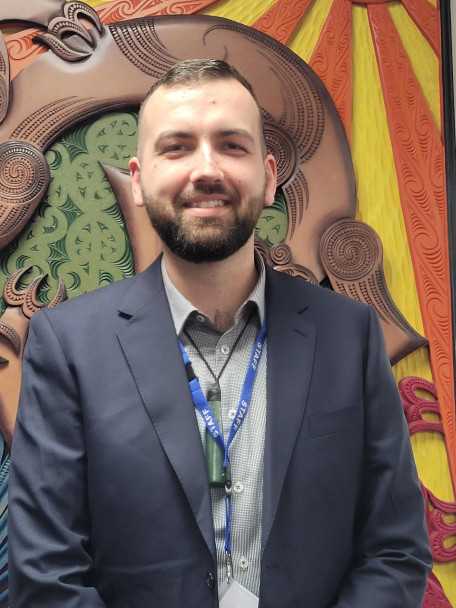15 September 2023
Leaning into leadership

Navigating imposter syndrome, being values-led, and “Tūwhitia te hopo, mairangatia te angitū - feeling the fear and doing it anyway” are some of the key takeaways that Principal Case Manager Caleb, now seconded Assistant Prison Director at Spring Hill Corrections Facility, had from the Aupiki tō Ara Poutama leadership programme.
Caleb was one of 11 participants nominated to be part of the programme last year. The group was made up of staff from the Central Region from different areas of Corrections – including those working in community, in psychology and programmes, and in custodial roles.
The aim of Aupiki tō Ara Poutama was to support and nurture the development of emerging leaders.
To start off the programme, the group all gathered at Tapuaeharuru marae for a powhiri, where they stayed for the first part of the programme.
“That was really special. I think how we felt welcomed onto the marae allowed us to really step into that space and had flow-on effects to our ability to speak, reflect and to build relationships with each other really fast.”
Having that opportunity to reflect, and learn from others, was one of the key aspects of the programme. Caleb says that the programme provided the opportunity for them to reflect on their own leadership journeys, define what they wanted to achieve as a leader, as well as hear from senior leaders in the organisation.
“One of the most valuable things for me was hearing that experiences like imposter syndrome are actually quite a normal feeling for a number of people in leadership.
But it’s about questioning and challenging those thoughts, and not letting it impact on our practice.”
After their initial welcome at the marae, the programme moved online to Microsoft Teams due to COVID-19 restrictions. While not as ideal as meeting face to face, participants had regular development wānanga (forums) with the rest of the group, as well as monthly meetings with their leader.
“This allowed us to have ongoing conversations reflecting on how we're developing, thinking about our ‘why’ as a leader, what we want to achieve in a leadership position, developing our ‘vision’ and how to lead through our values.
It was really valuable trying to define our ‘why’ and our leadership ‘vision’ as often when you're working with people in our environment, you don't always get those opportunities to sit down and reflect on what you're doing, the why behind it and what it is you want to achieve.”
Caleb says that his vision for leadership was defined as “being a leader who sets the foundations for future leaders to develop their aspirations and support sustainable change for our site, Te Ara Poutama Aotearoa and the justice sector as a whole.”
Bringing lessons from the programme into the Assistant Prison Director secondment
For Caleb, becoming a leader wasn’t something he had initially anticipated when joining Ara Poutama.
His initial goal was the clinical psychologist pathway, but when he started working as a probation officer, he saw the opportunity in the leadership space to have a broader impact by influencing and supporting leaders or supporting practitioners to improve their practice.
“I thought, as a practitioner I could work with someone one on one and affect change at that individual level. But as a leader, I could have a team of practitioners who are working with those people. I could support them to improve their practice and have a broader impact through that.”
At the time of the Aupiki tō Ara Poutama programme, Caleb was working as a Principal Case Manager. Soon after finishing the programme, a secondment as Assistant Prison Director came up.
“I thought it was the perfect opportunity to push myself further and go beyond my comfort zone.”
He says that since being in the Assistant Prison Director secondment, he’s been able to apply the lessons that he learnt during the Aupiki tō Ara Poutama programme.
“Coming into the Assistant Prison Director role, having formulated that vision and known my why – to have that positive impact on a larger scale – that’s been a clear focus and what’s been driving me strategically since I’ve been in this role.
It’s been about working with my leadership team, looking at and acknowledging challenges - like COVID-19 and transitioning to becoming a remand prison - that we’ve had over the past two to three years and thinking about how we can keep improving what we are doing. How can we achieve sustainable change for remand at SHCF, and support our teams to implement that too.”
Caleb says that being part of the Aupiki tō Ara Poutama programme has helped to challenge him to think about how he can develop the potential of aspiring leaders on site.
“For myself and those that went through the programme, we’ve had this opportunity ourselves, and have grown from it. So, we can be part of that support to build up our future leaders.”
His advice for people interested in a leadership position?
“I would say lean into opportunities, feel the fear and do it anyway, and be your authentic self.
I think that when we humanise our staff and humanise our leadership, it opens up the ability to engage more authentically, have a positive impact and get some really beneficial outcomes.”
Ready to make a move?
Start your journey - check out the a list of our current opportunities then apply online today!